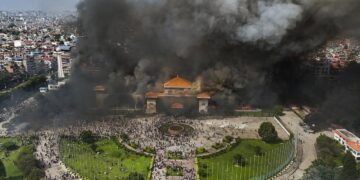Pak Taliban plans to liberate Khyber Pakhtunkhwa and establish Sharia rule

ISLAMABAD: The outlawed Tehreek-e-Taliban Pakistan (TTP) plans to oust the Shehbaz Sharif-led government from Khyber Pakhtunkhwa province, launch a campaign of terror against the army and install Sharia in the wake of rising terror activities in Pakistan. and state, according to a US State Department report.
According to the country’s report on terrorism 2021, the terrorist group uses the tribal region along the Afghanistan-Pakistan border to train and deploy its operatives, Dawn reported.
According to the report, the TTP receives ideological guidance from al-Qaeda, and some al-Qaeda members use the TTP as a “safe haven” in the Pashtun region near the Afghanistan-Pakistan border.
“This arrangement has given the TTP access to both AQ’s global terrorist network and the operational expertise of its members,” it said.
Apart from the TTP, the Balochistan Liberation Army (BLA), and the extremist Islamic State-Khorasan group (IS-K) are the main terrorist groups that focus on carrying out attacks in Pakistan. It further highlighted that Pakistan “experienced significant terrorist activities” in 2021.
Help from America
The report said the United States “offers assistance to support trade and economic development” in Pakistan, noting the link between terrorism and a lack of economic activity.
Aid to Pakistan from the United States includes partnerships with American businesses, civil society, and areas bordering Afghanistan. “This assistance is intended to improve the lives of the Pakistani people and support US objectives… The US continues to support people-to-people exchanges to alleviate misunderstandings and problems in the bilateral relationship,” the statement said.
In 2021, terrorist groups carried out terrorist attacks against various targets in Pakistan’s Balochistan and Sindh. To attack various targets, terrorists have used a variety of tactics, including improvised explosive devices, vehicle-mounted improvised explosive devices, suicide bombings, and targeted assassinations.
‘Little Progress’
The Counter-Terrorism Bureau’s ‘National Reports 2021: Pakistan’ said the Shehbaz Sharif-led country has made little progress in its pledge to eliminate all terrorist organizations without delay or discrimination. Islamabad experienced significant terrorist activity in 2021 – the number of attacks and deaths was higher than in 2020.
“Pakistan reviewed and revised its 2015 National Action Plan (NAP) to Counter Terrorism, reducing the NAP from a 20-point plan to 14 key points, but making little progress on the most difficult aspects – particularly the commitment to eliminate all terrorist organizations. Delay or discrimination,” the report read.
In 2018, Pakistan was designated as a Country of Particular Concern (CPC) under the International Religious Freedom Act of 1998. It was redesigned as CPC in 2019, 2020 and 2021.
In 2018, the FATF identified Pakistan as a jurisdiction with strategic deficiencies in its AML/CFT system. Pakistan remained on the FATF gray list in 2021.
In 2021, religious minorities in Pakistan faced significant threats from terrorist groups. On January 3, ISIS-K militants claimed responsibility for the killing of 11 Shia Hazara coal miners in Kachchi district of Balochistan. On April 21, five people were killed in a VBIED suicide attack in the parking lot of the Serena Hotel in Quetta, Balochistan.
According to the details of the investigation, the attack targeted both local and foreign officials. The TTP claimed responsibility for the attack and said the targets were police and law enforcement personnel.
It has identified IS-K as another group that poses a significant threat to Pakistan and consists primarily of former TTP members, the Afghan Taliban and the Islamic Movement of Uzbekistan. It is estimated to have 3,000 to 5,000 fighters and has been responsible for attacks on civilians and government officials in Pakistan.
IS-K, elements of Al-Qaeda and terrorist groups targeting Pakistan, such as the TTP, continue to use the Afghanistan-Pakistan border region as a safe haven.
(With inputs from ANI)
















